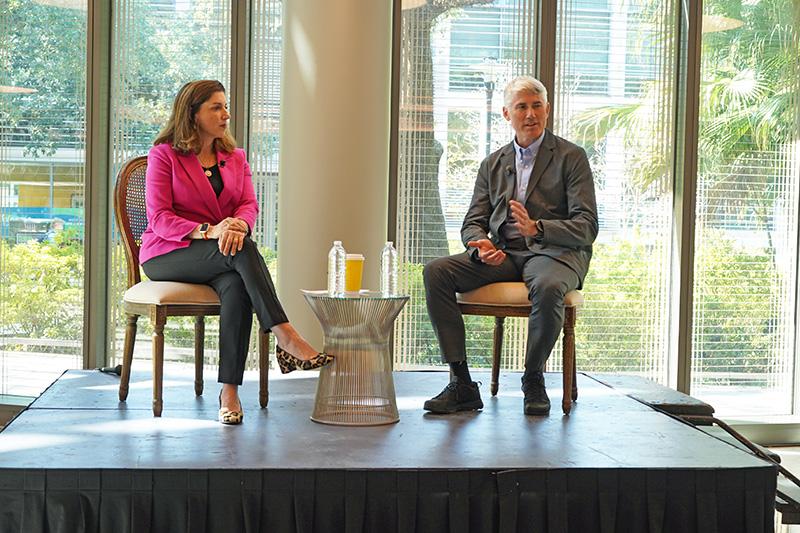Freeman lecturer discusses challenges, rewards of retail

Stuart Haselden (MBA ’98) became CFO of Lululemon Athletica in 2015, just as the once high-flying athleisure wear company was recovering from a costly product recall and a series of strategic missteps. Over the next five years, the company underwent a dramatic turnaround, doubling its revenues, growing its market cap from $6 billion to nearly $30 billion and significantly expanding its international footprint.
In an appearance at the Freeman School on Sept. 20, Haselden recalled his time at Lululemon and the experience of restoring the company’s profitability and reputation.
“One of the things in my career I’m most proud of is helping the company recover from some painful episodes — product quality issues, inadequate infrastructure to support growth and just disappointing our customers in many ways,” Haselden said. “I joined Lululemon at a time of transition when we were rebuilding the company growth path and investing in infrastructure. Helping the company navigate that really difficult transition and setting the stage for future success was really special.”
Haselden, who today serves as CEO of Arc’teryx, a global design company specializing in high-performance outerwear and equipment, discussed his life and career in retail as the Freeman School’s 2022 R.W. Freeman Distinguished Lecturer. The lecture, which was presented in a fireside chat format, was moderated by Aimee Adatto Freeman (MBA ’95).
After earning his MBA from the Freeman School in 1998, Haselden worked as a strategy consultant, but his real goal was to lead an organization. While talking with a friend who worked at Saks Fifth Avenue, he learned that the company had needs in the area of corporate finance.
“That was the opening,” Haselden said. “In some ways, the industry itself was secondary. It was more the people that I met at Saks were inspiring and impressive, and it was an opportunity for me to join a team that I felt I could be a part of and contribute to.
“Ultimately, I fell in love with the retail industry,” he added. “It’s a dynamic industry, fast paced and you’re reinventing your product line every few months. That level of competitiveness makes it more reliant on leadership than many other industries, so that was very appealing to me.”
Haselden spent six years as vice president for strategic planning at Saks, and later served as CFO, treasurer and senior vice president for finance at J.Crew before joining Lululemon. At Lululemon, he rose to COO and executive vice president, head of international, and he later became CEO of global lifestyle brand Away.
As CEO of Arc’teryx, Haselden leads the company’s global business strategy with a focus on building new vertical capabilities and accelerating regional expansion. Founded by mountain climbers Dave Lane and Jeremy Guard in 1989 and based in North Vancouver, Canada, Arc’teryx distributes its outdoor apparel and technical equipment through more than 2,400 retail locations worldwide, including 150 branded stores.
To conclude his talk, Haselden fielded questions from students, including one who mentioned seeing high-profile figures like Drake, Frank Ocean and Virgil Abloh sporting Arc’teryx jackets and asked if it was part of the company’s strategy to become a celebrity status symbol.
“It wasn’t and it’s not,” Haselden laughed. “The authenticity of the brand is what makes it appealing to these sort of pop icons. They’re drawn to it because, in many ways, we don’t care, and that creates in some way the appeal of the brand. It’s a super authentic brand. There’s a group of crusty old climbers right now in North Vancouver who are working on some harness, and they don’t know who Virgil Abloh is.”
Interested in advancing your education and/or career? Learn more about Freeman’s wide range of graduate and undergraduate programs. Find the right program for you.
Other Related Articles
- Alumna recalls trailblazing career in business, ministry
- DW News: Can the Fed stay independent under Trump?
- Fast Company: Are we in a K-shaped economy? Delayed employment numbers could reveal recession odds
- Newsweek: The Real Cost of Layoffs Isn’t In the Financials
- Conference explores opportunities in alternative investments
- CNN: Stocks rise ahead of tech earnings as Nvidia hits $5 trillion valuation
- Business Insider: Why a professor of finance isn't impressed by gold's stunning rally in 2025
- Alum launches fund to invest in Tulane-affiliated startups
